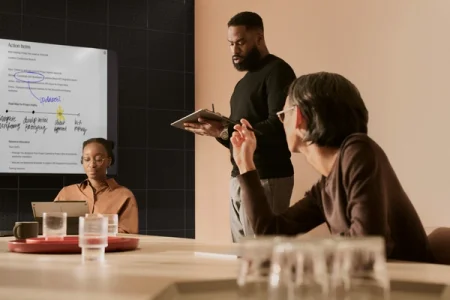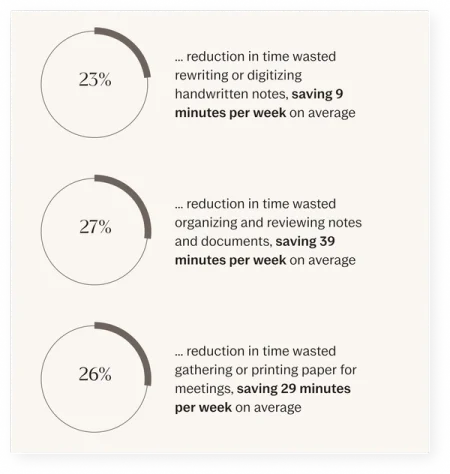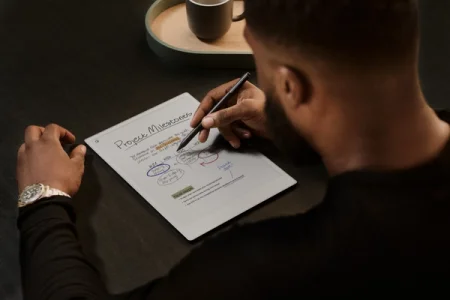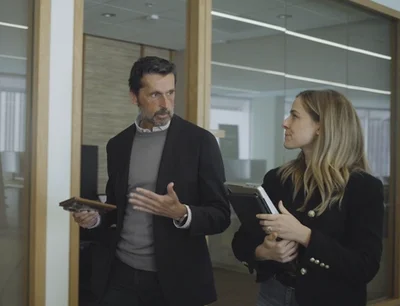Public sector transformation: Paper to digital
How reMarkable boosts digital transformation in public agencies, fostering better thinking with less paper.

Executive summary
Public agencies are at a pivotal moment, managing public resources, promoting sustainability, and delivering services amidst an often overwhelming amount of paperwork.
But paper doesn't have to be permanent. We conducted a 10-week study with UNESCO, achieving a marked reduction in paper use and enhanced efficiency. We also fostered an environment for better thinking and higher-quality work, aligning with the need for digital transformation in government and public agencies. The study found that reMarkable can:
- Save employees an average of 1 hour and 17 minutes a week on time previously spent on paper-related tasks.
- Lower the environmental footprint with a notable decrease in paper use, aligning with larger sustainability goals.
- Enhance the quality of work through a distraction-free environment, fostering better thinking and strategic focus.
This article dives into the specific challenges faced by public agencies, illustrates how reMarkable addresses these issues, and shares tangible results from the UNESCO study. The findings underscore a clear, measurable return on investment (ROI), not only in terms of operational efficiency but also in promoting a culture of innovation and environmental responsibility.

The public agency dilemma
- The paper burden: Traditional paper-based operations are becoming increasingly costly and inefficient. In the US, the federal government relies on nearly 10,000 unique forms, costing the public an estimated $117 billion and requiring over 10.5 billion hours annually to manage. The reliance on paper burdens taxpayers and slows essential services.
- Operational bottlenecks: Analog workflows create bottlenecks in public sector responsiveness, which is critical for decision-making in areas that directly affect public welfare.
- Sustainability challenges: Despite commitments to sustainability, public institutions struggle to lower their paper dependency, undermining broader environmental goals and making digital tools essential for achieving sustainability targets.
- Budget constraints: Operating under tight budgets, public agencies face the challenge of managing resources efficiently. The cost of paper, printing, and storage adds up, putting pressure on public finances.
- Data security and privacy: Traditional paper systems are vulnerable to breaches, loss, or unauthorized access, posing risks to data security and privacy compliance. The move to digital solutions is imperative to protect sensitive information and ensure compliance with data protection regulations.

reMarkable: The intelligent solution for digital transformation
Here's how reMarkable's paper tablets solve these problems and offer additional benefits:
- Digital note-taking: reMarkable replaces paper notebooks and documents with a digital notebook that feels just like writing on paper, eliminating the need for countless forms and documents. This cuts costs associated with paper and minimizes the physical space required for storage. Say goodbye to all those cluttered desks.
- Streamlined workflows: Features such as annotating directly on PDFs, handwriting conversion, and sharing notes by email enables faster decision-making and improved interagency collaboration, and can reduce administrative overhead.
- Sustainability: With reMarkable, agencies can dramatically decrease their paper consumption, supporting larger sustainability goals.
- Cost-effectiveness: The initial investment in reMarkable paper tablets pays off through savings on paper, printing, and storage costs. Over time, these savings can be redirected toward more critical areas of public service.
- Security and compliance: Digital notes with encryption capabilities offer a more secure approach to handling sensitive information than paper.
- Disaster recovery and continuity: With unlimited cloud storage (availble with Connect), reMarkable ensures data is backed up, supporting continuity of operations even in the face of physical damage or loss.
- Training and onboarding: Digital documentation simplifies the distribution of training materials and updates, streamlining onboarding and staff development.
- Quality of work: Our paper tablets are distraction-free by design, encouraging better thinking and creativity among staff. The tactile feel of handwriting fosters a deeper engagement with the material, which can lead to higher quality outputs in reports, policy documents, and strategic planning.

The impact of reMarkable at UNESCO: A case for change
A 10-week study with UNESCO at its Paris headquarters demonstrated that reMarkable saved employees an average of 1 hour and 17 minutes a week on paper-related tasks, including:

UNESCO employees pointed to the following benefits of a paper tablet at work:
- Document management: Sharing their experience, a participant exclaimed:
"The easy access to my documents during the Executive Board meeting and taking notes directly in those documents was absolutely a 'wow' moment. I no longer need to have a folder with hundreds of printed pages!"
This experience reflects a 27% decrease in time spent on organizing, reviewing, and searching for notes and documents, saving an average of 39 minutes a week per employee.
- Meeting efficiency: Another participant praised their paper tablet's impact on meetings and conferences:
"It's both useful and delightful. When at meetings or in conferences, it is essentially all you need to have your papers and talking points, to take notes, jot down ideas — and staying focused since it does not have the distractions of mobile devices and laptops."
The ease of use led to a 26% decrease in time spent gathering or printing paper notes for meetings, saving 29 minutes weekly. In particular, participants highlighted features like erasing, moving, and editing text.
- Performance and focus: A participant noted:
"I have less hesitation to handwrite notes because I know that these will be well organized. I still use laptop notes too, but now I have two go-to places depending on the situation."
Features like handwriting conversion led to a 23% time reduction in rewriting, reformatting, or digitizing notes.
- Enhanced learning and engagement: Another participant expressed:
"The product is awesome. It allows me to do many things at the same time: writing, reading, planning, thinking, etc." Adding to this, a colleague said, "Now when I follow up on past meeting items, I copy the meeting points in the same notebook and update them in advance, without the need to retype and always keeping the history," showcasing how reMarkable supports better thought organization and follow-up.
The testimonials from UNESCO participants demonstrate the real-world applications of reMarkable's features, leading to significant time savings, performance gains, and an enhanced quality of work. On average, employees saved 1 hour and 37 minutes per week, showcasing a clear, measurable ROI.
The pilot study not only reduced paper usage but also supported UNESCO's environmental sustainability goals, with participants noting a "paperless, better organization of notes" and more focused meetings.

How can we help?
Our study with UNESCO is an example of how reMarkable isn't just about better paper; it's about operational excellence, security, and fostering an environment where better thinking can thrive within public agencies.
Want to talk about how going paperless can drive digital transformation in your company? Click the link below to contact us.
Buy reMarkable for your team


